Underdetermination, Realism and Scientific Objectivity
DOI:
https://doi.org/10.23925/2316-5278.2021v22i1:e55778Abstract
The argument from underdetermination is one of the main arguments against scientific realism. I analyze a few versions of the argument, and I argue that it has its stronger version when interpreted as an indirect argument against scientific realism. This proposal requires distinguishing between three main ways of formulating the underdetermination argument. In its traditional formulation, the argument is based upon the formulation of rival theories empirically adequate to the available data. In a Kuhnian formulation, the argument is based upon the inexistence of a neutral algorithm of epistemic norms that are sufficient to determine theory-choice. But such formulations are broadly recognized to fail as global threats to scientific realism. Alternatively, I claim that the relevance of non-epistemic factors can be better appreciated by scientific realism if, rather than focusing on the contextuality of epistemic norms, one focuses on the indirect impact that non-epistemic factors have on the process of theory appraisal. In this version, the argument focuses on how aspects of the context of discovery impact scientific objectivity by modifying the evidence and theories which will be available to scientists in their epistemic environment.Downloads
Published
2021-12-31
How to Cite
Malavolta e Silva, B. (2021). Underdetermination, Realism and Scientific Objectivity. Cognitio: Revista De Filosofia, 22(1), e55778. https://doi.org/10.23925/2316-5278.2021v22i1:e55778
Issue
Section
Cognitio Papers
License
Copyright (c) 2021 Cognitio: Revista de Filosofia

This work is licensed under a Creative Commons Attribution 4.0 International License.









